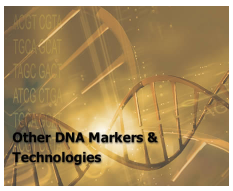Archival Notice
This is an archive page that is no longer being updated. It may contain outdated information and links may no longer function as originally intended.
Home | Glossary | Resources | Help | Contact Us | Course Map
Non-STR DNA Markers: SNPs, Y-STRs, LCN and mtDNA
This course provides information in the two lessons.
Other Nuclear DNA Markers and Technologies. Learn the basis of single nucleotide polymorphisms, including the advantages and disadvantages of their use in forensic genetics; the molecular genetics of the Y-chromosome and the applicability of Y-STR analysis in casework; the strategies used to analyze low copy number DNA; and the range of species and genetic markers used in non-human DNA analysis.
Mitochondrial DNA—Non-Nuclear DNA Markers. Learn to recognize the biological functions and contributions of mitochondria, the different features of nDNA and mtDNA, the different test techniques for mtDNA, the significance of mtDNA results for forensic and identity casework, and the current and future mtDNA testing technologies.
Taking the Course
Starting the course. Select the top link in the navigation on the right.
Navigating the course. We recommend you go through the course page-by-page using the Forward and Back buttons at the bottom of the page. You may skip around and select lessons using the navigation on the right.
PDF Version of this Course
There is a PDF version of this course available. View the Full Course PDF version.
You will need the free Adobe PDF reader that is available here.
Lessons
Information addressed in this interactive training program is delivered in two modules. Select a module below to begin.
| Lesson |
|---|
Additional Online Courses
- What Every First Responding Officer Should Know About DNA Evidence
- Collecting DNA Evidence at Property Crime Scenes
- DNA – A Prosecutor’s Practice Notebook
- Crime Scene and DNA Basics
- Laboratory Safety Programs
- DNA Amplification
- Population Genetics and Statistics
- Non-STR DNA Markers: SNPs, Y-STRs, LCN and mtDNA
- Firearms Examiner Training
- Forensic DNA Education for Law Enforcement Decisionmakers
- What Every Investigator and Evidence Technician Should Know About DNA Evidence
- Principles of Forensic DNA for Officers of the Court
- Law 101: Legal Guide for the Forensic Expert
- Laboratory Orientation and Testing of Body Fluids and Tissues
- DNA Extraction and Quantitation
- STR Data Analysis and Interpretation
- Communication Skills, Report Writing, and Courtroom Testimony
- Español for Law Enforcement
- Amplified DNA Product Separation for Forensic Analysts


